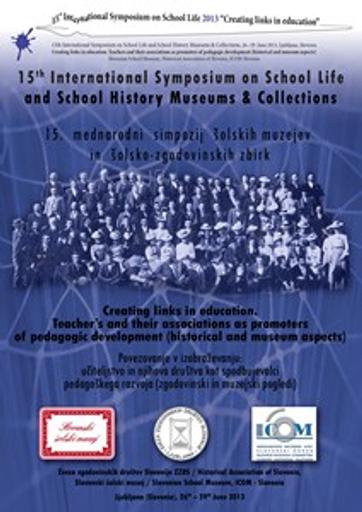/
Dogodki
/
Konference
The collection of the School and Childhood Museum and the rescue of life. History of the teaching practices of primary education teachers in the South of Brazil from 1930 to 1970


To delo avtorjev Ariclê Vechia, Antonio Gomes Ferreira je ponujeno pod Creative Commons Priznanje avtorstva-Nekomercialno-Brez predelav 4.0 Mednarodna
Datoteke (1)
Opis
The Museum School and Children: a place of History and Memory, created in 2008, located at Tuiuti University of Paraná has the following objectives: preserving a collection of elements of material culture School, as well as, creating and preserving a digital archive about the memory of those teachers who worked in the primary schools in the South of Brazil from 1930. The information was obtained through interviews with teachers, followed by a protocol. By this collected data this communication seeks to recover the history of life and school practices of 10 primary school teachers who have exercised their profession in School Groups of private and public schools in the South of Brazil from 1930 to 1970. The study shows that from first decades of the twentieth century, the teaching of primary education in Brazil was almost exclusively for women. These teachers, as a rule, were graduated in a Escola Normal (Elementary Teaching School) primary and secondary. According to their statements, it can be seen that the teaching School in Paraná, was targeted to the young women of upper middle class society. Studying at a Escola Normal, gave "status" because teaching was a profession of prestige in society, besides being one of the few acceptable professions for women in the society of that time. One of the requirements for being a teacher was the uprightness of character, because it was up to the teacher not only teach students the skills needed to pursue a future career, but also to instill in them values such as respect for the laws and authorities and moral habits, personal hygiene and social and crafts. Anyway, it was up to the teacher the task of instilling in children the civic duties of a good Brazilian. Teacher´s associations of that educational level were practically inexistent or irrelevant in the studied period.
Metapodatki (12)
- identifikatorhttps://hdl.handle.net/11686/37648
- naslov
- The collection of the School and Childhood Museum and the rescue of life. History of the teaching practices of primary education teachers in the South of Brazil from 1930 to 1970
- O acervo do Museu da Escola e da Infância e o resgate da História de vida e das práticas docentes de professoras do ensino primário no Sul do Brasil, 1930 a 1970.
- ustvarjalec
- Ariclê Vechia
- Antonio Gomes Ferreira
- soavtor
- Branko Šuštar (mod.)
- predmet
- zgodovina
- šolstvo
- muzej
- history
- school system
- museum
- opis
- The Museum School and Children: a place of History and Memory, created in 2008, located at Tuiuti University of Paraná has the following objectives: preserving a collection of elements of material culture School, as well as, creating and preserving a digital archive about the memory of those teachers who worked in the primary schools in the South of Brazil from 1930. The information was obtained through interviews with teachers, followed by a protocol. By this collected data this communication seeks to recover the history of life and school practices of 10 primary school teachers who have exercised their profession in School Groups of private and public schools in the South of Brazil from 1930 to 1970. The study shows that from first decades of the twentieth century, the teaching of primary education in Brazil was almost exclusively for women. These teachers, as a rule, were graduated in a Escola Normal (Elementary Teaching School) primary and secondary. According to their statements, it can be seen that the teaching School in Paraná, was targeted to the young women of upper middle class society. Studying at a Escola Normal, gave "status" because teaching was a profession of prestige in society, besides being one of the few acceptable professions for women in the society of that time. One of the requirements for being a teacher was the uprightness of character, because it was up to the teacher not only teach students the skills needed to pursue a future career, but also to instill in them values such as respect for the laws and authorities and moral habits, personal hygiene and social and crafts. Anyway, it was up to the teacher the task of instilling in children the civic duties of a good Brazilian. Teacher´s associations of that educational level were practically inexistent or irrelevant in the studied period.
- O Museu da Escola e da Infância : lugar de História e de Memória, criado em 2008, sediado na Universidade Tuiuti do Paraná, tem como objetivos: preservar um acervo com elementos da cultura material escolar, bem como criar e preservar um acervo com a memória de professoras que atuaram no ensino primário no Sul do Brasil a partir de 1930. As informações foram obtidas por meio de entrevistas, seguindo-se um protocolo. Usando como fonte estes dados coletados, esta comunicação procura resgatar a história de vida e das práticas escolares de 10 professoras do ensino primário que exerceram sua profissão em escolas publicas e particulares no Sul do Brasil de 1930 a 1970. A partir das primeiras décadas do século XX, o magistério do ensino primário no Brasil ficou a cargo, quase que exclusivamente das mulheres. O estudo demonstra que essas professoras, via de regra eram formadas nas Escolas Normais Primárias e Secundárias, públicas ou particulares. Segundo seus depoimentos, constata-se que a Escola Normal no Paraná, era direcionada para as moças da classe media alta da sociedade . Cursar uma Escola Normal, dava status , pois o magistério era uma profissão de prestigio na sociedade além de ser uma das poucas profissões aceitáveis para as mulheres na época.Um dos requisitos para ser professora era a retidão de caráter, pois cabia à professora não apenas ministrar aos alunos os conhecimentos necessários para o exercício de uma futura profissão, mas incutir-lhes valores como respeito às Leis e às autoridades; hábitos morais, de higiene pessoal e social e de trabalhos manuais. Enfim, à professora cabia a tarefa de incutir nas crianças os deveres cívicos de um bom brasileiro. As Associações de Professores deste nível de ensino eram praticamente inexistentes ou inexpressivas no período estudado.
- založnik
- Slovenski šolski muzej
- Zveza zgodovinskih društev Slovenije
- ICOM Slovenija
- Inštitut za novejšo zgodovino
- datum
- 2013
- 26. 06. 2013
- tip
- video
- jezik
- Angleščina
- jeDelOd
- pravice
- licenca: ccByNcNd
